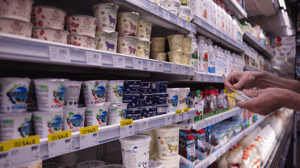Local growers add luster to produce merchandisingLocal growers add luster to produce merchandising
An expanding base of supermarket shoppers are seeking fruits and vegetables from nearby farms
October 3, 2024

Stores that market fruits and vegetables from nearby growers are becoming more attractive and busy produce destinations.
In a November 2023 nationally representative survey for the Power of Produce 2024 report, 64% of fruit and vegetable eaters indicated that they want their stores’ produce departments to carry more locally grown products, up from 60% a year earlier and just 53% four years before. Arlington, Va.-based FMI — The Food Industry Association, published the report.
Offering locally grown produce enables smaller regional grocers to better compete with the national chains, said Jim Sullivan, vice president of produce for Spokane, Wash.-based Yoke’s Fresh Markets, which operates 19 Yoke’s Fresh Market stores in Idaho, Washington, and Montana.
“The small farmers do not have the products or capabilities to go into the big stores,” Sullivan said at the 2024 Organic Produce Summit in Monterey, Calif., noting that a Yoke’s niche is “carrying something that the ‘big guys’ aren’t,” such as locally grown cherries.
Yoke’s also uses QR codes that enable shoppers to access information on local farmers with their smart phones, and each store has the flexibility to switch some produce selections and suppliers based on their specific shopper interests, he said. “If an item doesn’t sell, do not carry it and try something else,” Sullivan said.
The nearly three hundred Tops Friendly Markets, Price Chopper, Market 32, and Market Bistro stores controlled by Schenectady, N.Y. -based Northeast Shared Services also base their local produce selections on market dynamics, Jeff Cady, vice president of produce and floral, said at the Summit. The company has retail outlets in New York, Massachusetts, Vermont, Connecticut, Pennsylvania, and New Hampshire.
“One of our core strengths is being the ‘neighborhood store,’ and we look at what the consumers in an area want,” he said, adding that the chains highlight locally grown produce in their weekly ads and in-store signage.
Fayetteville, Ga.-based Nourish + Bloom Market, an autonomous grocer with four Atlanta-area locations, also emphasizes locally grown, Jilea Hemmings, founder and owner, said at the Summit.
“Consumers are resonating and connecting to the story of the local farms, so we bring in things that are inherent to the South,” she said, noting that such selections include potatoes and collard greens.
The retailer also uses QR codes that enable consumers to access grower-provided data, Hemmings said. “Local is something that consumers are willing to pay for,” she said. “We will take local before we take a national product, and every store can personalize items to the customer. Items that are not moving can be changed.”
About the Author
You May Also Like






